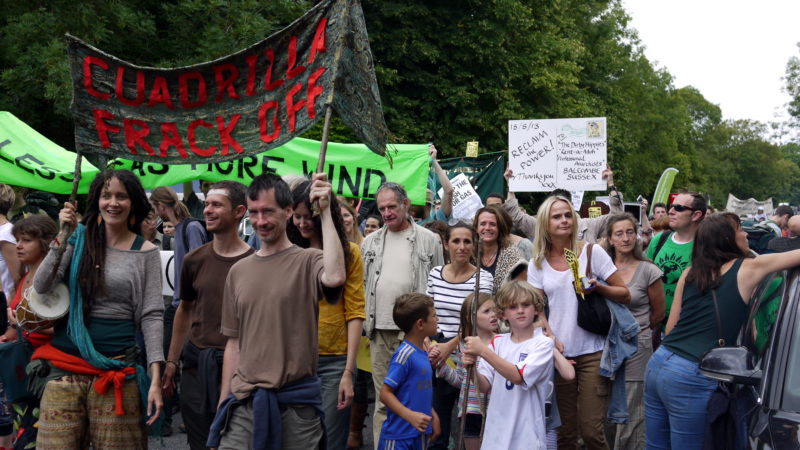Five years after campaigners kept drilling for gas at bay in the Sussex village of Balcombe, frackers Cuadrilla have been given the green light to come back. We won't let them.

Balcombe is a village in West Sussex that’s been represented by the Tories since 1880, when they took it off the Liberals.
If you arrive by train from either London or Brighton, it feels like you’re stepping into a different country. And not just because when I did so in 2013, I turned right out of the station and immediately came to a giant pro-hunting billboard hoisted high into a large tree.
For an old farming now commuter village, it has acquired, however, a special place in the nation’s history, for the events of 2013, where it hosted, surprisingly comfortably, the first major anti-fracking protests.
From the point of view of those opposed to fracking, the location and timing were pretty much perfect. It was summer, it was green, easily accessible by public transport, and there was strong local support – including from a Tory Party member who turned up regularly with a Volvo station wagon full of supplies for the protection camp.
It was a place to learn how to build a movement that’s expanded far beyond traditional environmentalists, drawing in grandmas and grandpas, farmers and teachers, business owners and students – all opposed to the nightmare of fracking, not just in their communities, but anywhere.
In Balcombe, children’s facepainting sessions were conducted, tea-parties held, and lots of education was delivered about the realities of climate change and extreme energy. It was where Green MP Caroline Lucas was arrested, and subsequently found not guilty of any offence.
It was an ideal place too, for pan-European links to be built. A big rally with Green MEPs Rebecca Harms and Jose Bove helped spread what had been learned. It was part of a continent-wide growth of the movement not only against fossil fuels but in favour of renewables and energy conservation – indeed it led to a big solar farm being built in the village.
Since then, the struggle against fracking has largely moved north. Through Upton, near Chester, to Barton Moss near Manchester, now focused on Preston New Road and Kirby Misperton – uniting Lancashire and Yorkshire in the No Fracking Way march.
But now, in 2018, the crucial year when the fracking industry can and must be stopped in England, as it already has been in Scotland and Wales (although it appears the industry is determined not to listen to democratic decision making, having just announced it will challenge the Holyrood decision), we’ve come a full circle.
Cuadrilla, despite the unanimous opposition of Balcombe’s parish council, is set to return to oil drilling in the village.
But in five years, the world has moved on a long way. The anti-fracking movement in England is well-organised, united and used to providing support for new communities drawn into the struggle. The argument for fracking used in 2013 – that gas was needed as a “bridging fuel” has been utterly destroyed by the rapid advance and falling cost of renewables.
The fracking industry, which hoped to be in full swing by now, has got nowhere (since causing earthquakes in Blackpool in 2011), and public opposition is at record highs, with only 16% of people saying they support it.
And we’ve got Tories, keen to try to remove some of the toxicity from their “brand”, desperately flinging out Green measures, from praising the EU-led ban on neonicotinoid pesticides to expanding the plastic bag tax.
If they’re serious about burnishing their “green” image – there’s only one way to go: a ban on fracking and other extreme forms of fossil fuel energy.
And an industry that has burned through money without results is going to face serious questions from investors about how much more money can be thrown at something for which the public has clearly refused consent.
Natalie Bennett is the former leader of the Green Party of England and Wales
Left Foot Forward doesn't have the backing of big business or billionaires. We rely on the kind and generous support of ordinary people like you.
You can support hard-hitting journalism that holds the right to account, provides a forum for debate among progressives, and covers the stories the rest of the media ignore. Donate today.




One Response to “Fracking is back in Balcombe. But this time the anti-fracking movement is ready”
JOHN KAYE
There was no fracking and fracking was never contemplated at Balcombe. The testing was for conventional oil drilling.
Is progressive journalism inaccurate journalism?